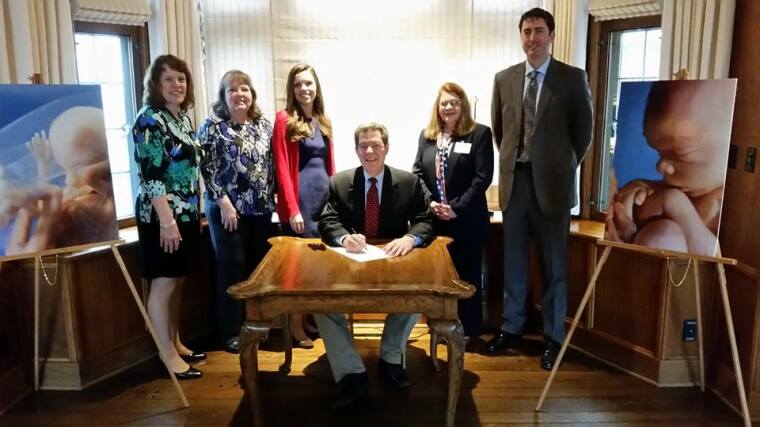Kansas Governor signs order protecting clergy & religious organizations denying service to same-sex couples

TOPEKA, Kan. (Christian Examiner) -- Kansas Governor Sam Brownback issued an executive order Tuesday prohibiting the state from taking action against clergy or religious social service agencies who refuse service to same-sex couples due to sincerely-held religious beliefs.
According to The Wichita Eagle, the order came on the same day state employees were informed their same-sex spouses could be added to health insurance plans.
Noting that both the United States Constitution and the State of Kansas have provisions which restrict government interference with the right of individuals to practice religion according to their consciences, Brownback prohibited state officials from taking "discriminatory action" against both individuals and agencies who apply that religious practice to facilitation of services for same-sex couples.
"The State Government is prohibited from taking any action inconsistent with the restrictions placed upon the State Government by the United States Constitution, or the Kansas Constitution, or the Kansas Preservation of Religious Freedom Act, against any individual clergy, religious leader, or religious organization on the basis that such person or organization believes or sincerely acts in accordance with a religious belief or moral conviction that marriage is or should be recognized as the union of one man and one woman," Brownback's order reads, in part.
The extension to religious social service agencies means that organizations such as faith-based adoption agencies and homeless shelters can refuse service to same-sex couples even if those agencies receive state funds.
The Kansas Conference of Catholic Bishops applauded Brownback's action.
In their official statement, the bishops argued that freedom of religion in American has never been confined to the interior of a church building.
"In this country, religious freedom has meant the right to live one's faith in one's daily life, at home and at work, in private and in public," it said. The statement also claimed the U.S. Supreme Court's 5-4 Obergefell v. Hodges decision overturned the will of 70 percent of Kansas voters who, in 2005, approved an amendment to the state constitution defining marriage as the union of one man and one woman.
"Given the far reaching effects that redefining marriage will have on the law, and the fact that this incredibly consequential change in national social policy was effected by judicial fiat rather than the democratic process, there is tremendous uncertainty as to what the Obergefell decision will mean for everyday people just trying to live their faith as they always have," the Catholic bishops' statement continued.
Terry Fox, Pastor of Summit Church in Wichita, Kansas, told Christian Examiner last fall that gay marriage is a states' rights issue.
"The people of Kansas did not change the definition of marriage. This was forced upon us from outside forces; and not only is this a moral issue, but it's a state's rights issue," Fox said. "If they can order us to change our marriage laws today, what's coming next and how soon will it be?"
Fox played a key role in getting the state constitution marriage amendment on the ballot in 2005.
The Wichita Eagle also reported that Fox applauds Brownback's executive order but believes further protections are needed. The newspaper reports that after meeting with 60 local pastors, Fox said, "There is a great passion here that we need some religious freedom protection not just for churches but for Christian business owners."
Other Kansans disagree with Brownback's action.
Rev. Kent Little, pastor of Wichita's College Hill United Methodist Church -- which supports same-sex rights -- asserts the Governor's order was unnecessary.
"The ruling from the Supreme Court wasn't a religious ruling. It really was about civil rights. In my opinion it doesn't affect the religious community," Little said.